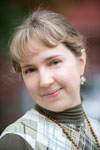Golynchik, E.O.

Cand. Sci. (Psychology)
Associate Professor, the Department of Social Psychology, Faculty of Psychology, Lomonosov Moscow State University.
-
Change Response Styles and Teachers' Perceptions of Organizational Culture and Conflicts in the SchoolLomonosov Psychology Journal, 2022, 3. p. 85-118read more2313
-
Backstage. There is a shortage of socio-psychological research devoted to the systematic consideration of the problem of teachers' attitude to changes in modern schools at three levels: organizational, interpersonal and individual-personal.
Objective of the study is to identify the interrelationships of change response styles with teachers' perception of organizational culture and conflicts in the school.
Methods. A questionnaire survey was conducted in a remote format using an online platform. Used: the questionnaire "Change response styles", "Methods of diagnosing the organizational culture of the school", the method "Conflicts in the educational environment".
Sample. The study involved 66 teachers of senior classes of secondary schools and lyceums in several regions of Russia (Zarechny city, Penzenskaya oblast; Lesnoy city Sverdlovskaya oblast; Novouralsk, Sverdlovskaya oblast).
Results. Teachers with a conservative change response style prefer a traditional stable environment and are focused on a resultive organizational culture of the school; they estimate the frequency of conflicts between teachers and pupils at school with the involvement of parents lower. Teachers with an innovative response style strive for constant progress and innovation and are guided by the innovative culture of the school; a positive correlation was revealed with the assessment of the frequency of conflicts between teacher and pupil with the participation of a parent. Teachers who are representatives of the reactive change response style have a hard time adapting to any type of change, prefer the role culture of the school; there is a positive relationship with the degree of emotional discomfort caused by several types of conflicts involving the teacher. Teachers with a realizing response style flexibly adapt to various changes and prefer innovative and family types of school culture; they have a negative relationship with emotional discomfort from conflicts involving the teacher.
Conclusion. The results obtained allow us to determine the perspective of further steps of the author's team, which consists in building a three–way model of the educational space "school ― pupil ― family" with the inherent properties of a systemic self-developing object.
Keywords: educational environment; change response styles; school organizational culture; perception of conflicts in the school DOI: 10.11621/vsp.2022.03.06
-
-
Multipolar world: From politology to social psychology.Lomonosov Psychology Journal, 2012, 1. p. 49-60read more5122
-
The concept of “multipolar world” is analyzed in the presented article; some perspectives of social-psychological research of forming multi-polarity in the present world are outlined. The students’ representations of multipolar world and of the countries-centers of influence in the modern world were analysed from the social representations theory perspective.
Keywords: multipolar world; social representations theory; countries-centers of influence in the modern world; representations of Russia; students
-









